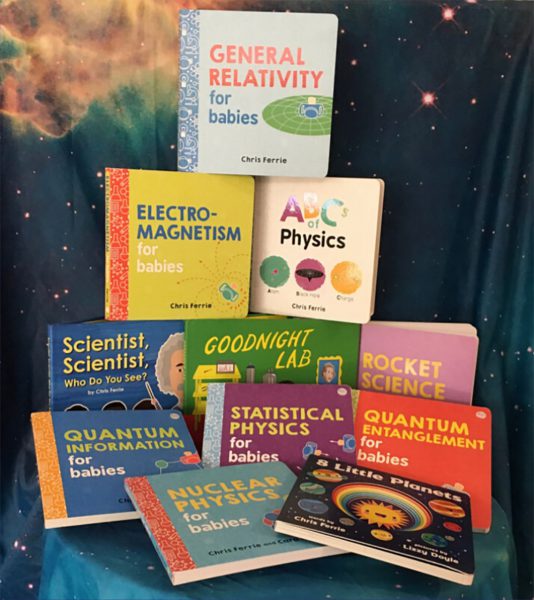
I remember watching live the announcement of the discovery of the Higgs Boson. Seeing the achievements of separate scientific studies, confirming the lifetime work of a sweet old scientist was inspiring. So inspired, and so in love with physics, I picked up my old ‘Physics in Context’ textbook. I opened to page one and calculated. I proudly checked my answers, and my results… were, less than stellar. I failed Year 11 physics. Again!
The point I’m alluding to is that Chris Ferrie’s University for Babies books isn’t just for babies. Sometimes these concepts need to be reduced for those of us who love but don’t quite understand, physics. In the interests of fairness, I tested these books out on a 10-month-old baby, a five-year-old child, and myself, a 30-something-year-old parent, to weigh the results across Ferrie’s many target audiences.
Firstly, there are HEAPS of Ferrie’s children’s books, 45 to date, and they cover subjects in the STEM from General Relativity to Oceanography. Ferrie breaks down complex topics to the purest form, for babies and adults. Our household owns 4 of Ferrie’s books, The ABCs of Physics, Newtonian Physics for Babies, General Relativity for Babies and the Parody book Scientist, Scientist, Who Do You See?
My 10-month-old grasps at images that contrast with the white background. There’s nothing complex about the illustrations, which helps grabs his attention. The content, however, is slightly beyond him. He practices the laws of Newtonian physics because he can’t balance well enough to stand on his own, but I’m unconvinced he understands the concept. As his mother, I live in hope that his subconscious is absorbing the info, and he may still become that star engineer-astronaut-neurosurgeon-billionaire that he is one day destined to be.
My five-year-old, who communicates better, tell me in a pre-programmed robotic voice she likes these books because “they help you learn.” She’s displeased that Elsa or Ariel don’t make an appearance. However, she can tell me the basics, balls have mass, and gravity is a force. That’s more than some adults. The ABC of Physics is a bit more her style, with colours and more sophisticated graphics.
Scientist, Scientist, Who Do You See? throws her. She knows the rhyming pattern of the original Brown Bear book, but Ferrie’s parody stretchwa to make words rhyme, and the metering is a tad off.
These books are wonderful. When you first see them for sale, you assume it will be a laugh to get them for your babies, or friends’ babies, as they’ll never understand Quantum Entanglement or Bayesian Probability.
You open them and realise this isn’t satire or comedy, Ferrie engages his audience with serious and complex science stripped down to its bare basics for everyone. It’s also helpful to have an easy, no-nonsense pick-up-and-read nonfiction book for kids. The books are available through the observatory shop. Check them out next visit, and if the title you want is not in stock, we will gladly order it for you.





